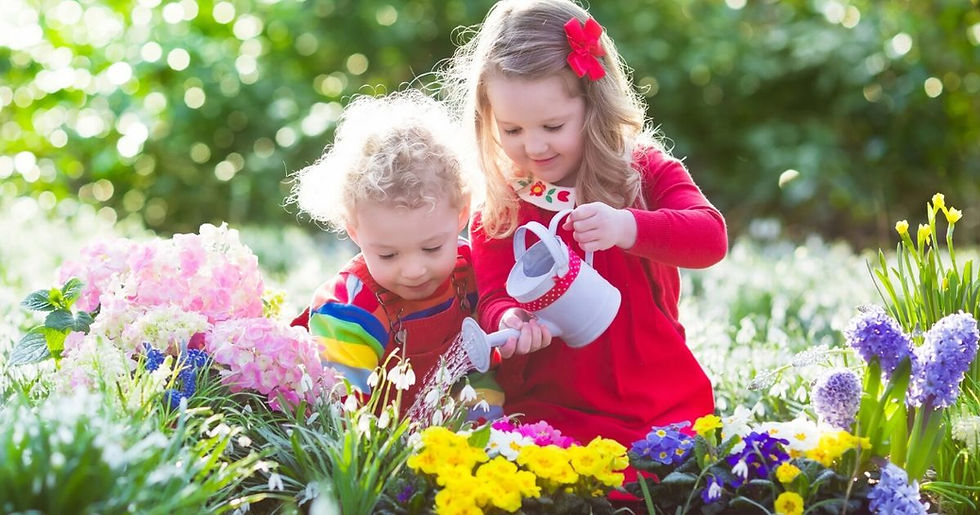Kids’ Garden: It’s Fun and Educational
- Rifke Hill
- Oct 26, 2019
- 3 min read
Gardening is arguably the most productive outdoor adventure for kids.
It benefits them in a wide variety of ways… in fact, I doubt that it’s possible to estimate the positive impact that growing plants can have on a child.
In this article, I’d like to share my favorite reasons to teach kids to garden.
They learn priceless skills.
They’ll learn to grow their own organic food. I mean, how can you put a price on that? It’s a skill they can employ to make pocket money at the local farmer’s market, and an asset they can continue to benefit from and enjoy in their adult years.

Botany and biology concepts are brought to life.
Basic botany is an integral part of getting a plant to thrive. Biology concepts are passed on when kids learn about the soil microbes that cause plants to flourish or droop, and about the motley crew of tiny creatures that live out their lives on garden plants. If you’re a homeschooling parent, this is the sort of practical learning opportunity that made you take on this lifestyle. Homeschooled kids get a fascinating hands-on class when they’re growing plants.

Gardening builds physical health.
Fresh air. Vitamin D. Loads of exercise. Kids reap all the usual benefits of outdoor play when they’re gardening… plus some awesome extras. Children who grow their own fresh veg are more likely to eat it, either right there in the garden as a snack, or after helping to harvest and prepare it as part of a meal. The focused activity of gardening is also an effective way of developing fine motor skills for toddlers. A bonus health benefit: research shows that certain microbes living in soil may boost our mental health.

Gardening grows character.
The physical fun that happens outdoors helps children focus by lengthening their attention spans. It also teaches them to be responsible: if plants aren’t cared for every day, they die, and all the dedication put in up until that point is wasted. Real consequences like this bring the message of responsibility home for children. It helps make responsibility a habit. And reaping a delicious harvest, watching the family partake and enjoy, builds confidence… it feels great for a gardener of any age.

It’s loads of fun.
There’s never too much healthy fun. Once they get into it, kids find gardening exciting, inspiring and invigorating. Our best tip for encouraging kids to love gardening is to start when they’re young: poking seeds into soft soil, watering and watching little green shoots pop up are timeless fun activities for toddlers.

If you’d like your kids to do more gardening, a children’s gardening set will get them excited and itching to work the soil. Our set offers everything a budding gardener needs. It includes a small watering can, child-sized gardening tools (a high quality, metal-tipped spade, rake and trowel), biodegradable peat pots for seedlings, plant labels and a canvas garden tool bag to keep it all in.
Growing plants shows them how to respect the planet.
As someone who gardened daily as a kid, here’s my final takeaway: the impact of growing up like this is all the above, but also something deeper that’s hard to define. It’s as though the lifestyle becomes ingrained in you, and as an adult, you don’t want to step away from it. You perpetrate it and teach it to your own kids. You teach them to relish the benefits of a healthy diet and lifestyle, and to respect and admire the glory and complexity of nature. I think that facilitating a bond between our kids and nature is the best way to ensure they will care about the planet they are inheriting.


Written by Rifke Hill
About the Author
Rifke Hill was raised on the sort of farm your grandparents told tales about – milking cows, gathering eggs, hoeing the soil, and building fires to heat water. She now spends part of her time copywriting online as a freelancer. The rest of it is spent nurturing and teaching her four energetic children, growing vegetables, baking bread, reading voraciously, having coffee with the neighbors, and enjoying the sunny slopes of the smallholding where she lives, in the Garden Route, South Africa.



Comments